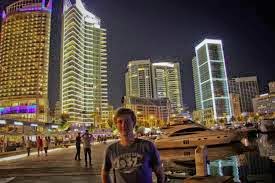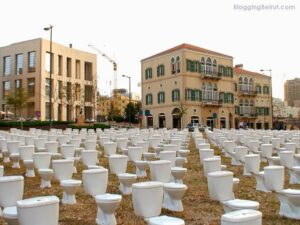My City is My Country
My City is My Country
There is a name for it, this meandering existence: these blocks of concrete that line the sidewalks; those checkpoints that shield our suicide bombers’ favorite spots; the embassies impregnating themselves in the middle of bustling neighborhoods; the security barriers that usher you in and out of no-go zones wringing the houses of every other big chief.
There is a name for it, this city center that shutters every time parliamentarians convene under democracy’s dome to discuss nothing. Every time the families of kidnapped soldiers set up tent to plead for answers from a government that has none.
There is a name for a city donning the ornaments of its dread.
| Families of Kidnapped Soldiers Demonstrating in BCD |
Not so long ago, Lebanon could boast alone this architecture of siege, a battered mother of grand old metropolises that had become unruly hubs of fear. Not anymore. In Sanaa, Tripoli and Benghazi; in Homs, Aleppo and Damascus; in Basra, Karbala and Baghdad, is our frightened future in pastiche. To each city, its own style and pace of degradation, it goes without saying, but from all, we can be sure this is the saddest of farewells to yesterday’s semblances of peace.
And still, I’d like to pretend—really, I would—that this meandering existence brings an absurd quality to my Beiruti life, but the absurd has long settled into run-of-the-mill. Should a Jihadi explode in the Southern Suburbs, I pray for it as if another country. Should Bab al Tebbeneh and Jabal Muhsin do battle across Syria Street up north in Tripoli, I mourn it as if another continent. Should an assassin’s target shatter around, for example, Solidere’s STARCO, I fret. Shit! This is right up my alley.
Some dilemmas refuse to die in this locale: which districts to shun, which cantons to avoid, which roads to skip, cafes to hang out in—and not. When to stay down and put and when to ignore the gunshots. For spooks and fly-by-night lovers this is such fun. For the rest of us, this late in the game, the silly hype is all but moot.
This is the way we are. The way we live. Checkered days in checkered cities in a checkered country. Neither at war nor in repose. Or as the Daily Star put it in a fleeting moment of eloquence, “Neither in emergency nor in development mode.”
But as makeshift and haphazard as they might appear, the architectural eyesores mark the surface of this withering state, much like they would a brigand’s face. These blights and scars tell tales about lineal bad behavior and full-blown system failure. In fact, they’re of a piece with the tattered politics we have come to wear so well.
Sunni-Alawite collisions in Tripoli, terrorists hanging about freely in Sidon’s Ain al Helweh, Hezbollah and Jihadis fighting it out in “peripheral” Qalamoun and Arsal, the president’s empty chair even when he’s there…: these are just a few of the particulars of a “Lebanon” in total disarray.
 A Main Entrance to the City Center |
And, of course, with the roadblocks and barricades come battalions of steel and glass skyscrapers laying waste to our historical memory; greenery strewn for the populace, the way scrooges would breadcrumbs to the hungry; traffic choking the arteries of a capital housing literally half of this warring family; exorbitant electricity that lights up only for the finest of Beirut…
Like this, and forever, I can go on.
And so we meander, at times furious, at others oblivious, going about our chores as best we can, marveling at how well we are doing—considering. Art, we have. Plenty! Entrepreneurship too. Promising startups spawning great products. Corruption is nearly everywhere, true. But the book fairs dot the year and the music festivals turn the summer into one happy sing along.
 |
| Nada Sehnaoui’s Haven’t 15 years of Hiding in Toilets Been Enough |
They say we are the incubator for the rest of the Arab world. I fear we could be, with replicas outdoing the worst of our instincts. In 17 years of civil war, we sent 135,000 to their grave. Twelve and four years into their hell, Iraqand Syria, respectively, are putting our body count to shame. Let’s see in what other ways they will mimic us when they grow tired of all out slaughter and opt for violence of the low-grade range.
In preparation for what awaits me in this metastasizing Levant, I haven’t really been doing much, except watching the old order unraveling. No, not Sykes-Picot and its boundaries, but the insides of postcolonial regimes that, once upon a time, were all embracing and all mighty.
I think it was around 1992, barely a year after I had unpacked my bags in Ain al Mreisseh, when I came to understand that—for all intents and purposes, and bureaucratic formalities aside–my city is my country. Even those who still rise when national anthems play and armies parade know that this mishmash of an enclave has relinquished its monopolies on practically all levers of authority, sacrificing with it any exclusive claim on loyalty.
You could say this is the Lebanese version of the Arab city-state rising, divvied up, cleansed, shambolic and all but sovereign. Other collapsing realms in this region, no doubt, have theirs.
This is contagion in a nutshell–a sieving of a sort, as communities en masse escape into safety among their kind. In its specifics, the future for far too many innocent souls may be impossible to imagine, the experts warn, but already much of what we are witnessing today is surely unimaginable.
Dubai, you ask? Well, that’s the one, I suppose, against which we will forever be juxtaposed when they cite outliers or conflicting regional trends. Dubai is one hell of a story, I’ll admit. But every time I visit, I always find it very balancing to remember the many in the dungeon when enjoying my time in the sun.
And, by the way, if you are in search of material about what in the world is wrong with the world, I recommend the latest book by Columbia University’s Saskia Sassen, appropriately enough titled Expulsions.

